Related Research Articles

In Greek mythology, Achilles or Achilleus was a hero of the Trojan War who was known as being the greatest of all the Greek warriors. A central character in Homer's Iliad, he was the son of the Nereid Thetis and Peleus, king of Phthia and famous Argonaut. Achilles was raised in Phthia along with his childhood companion Patroclus and received his education by the centaur Chiron. In the Iliad, he is presented as the commander of the mythical tribe of the Myrmidons.

In Greco-Roman mythology, Aeneas was a Trojan hero, the son of the Trojan prince Anchises and the Greek goddess Aphrodite. His father was a first cousin of King Priam of Troy, making Aeneas a second cousin to Priam's children. He is a minor character in Greek mythology and is mentioned in Homer's Iliad. Aeneas receives full treatment in Roman mythology, most extensively in Virgil's Aeneid, where he is cast as an ancestor of Romulus and Remus. He became the first true hero of Rome. Snorri Sturluson identifies him with the Norse god Víðarr of the Æsir.

Gaius Valerius Catullus, often referred to simply as Catullus, was a Latin poet of the late Roman Republic who wrote chiefly in the neoteric style of poetry, focusing on personal life rather than classical heroes. His surviving works are still read widely and continue to influence poetry and other forms of art.

In Greek mythology, Hector is a Trojan prince, hero and the greatest warrior for Troy during the Trojan War. He is a major character in Homer's Iliad, where he leads the Trojans and their allies in the defense of Troy, killing countless Greek warriors. He is ultimately killed in single combat by Achilles, who later drags his dead body around the city of Troy behind his chariot.

The Trojan War was a legendary conflict in Greek mythology that took place around the 12th or 13th century BCE. The war was waged by the Achaeans (Greeks) against the city of Troy after Paris of Troy took Helen from her husband Menelaus, king of Sparta. The war is one of the most important events in Greek mythology, and it has been narrated through many works of Greek literature, most notably Homer's Iliad. The core of the Iliad describes a period of four days and two nights in the tenth year of the decade-long siege of Troy; the Odyssey describes the journey home of Odysseus, one of the war's heroes. Other parts of the war are described in a cycle of epic poems, which have survived through fragments. Episodes from the war provided material for Greek tragedy and other works of Greek literature, and for Roman poets including Virgil and Ovid.
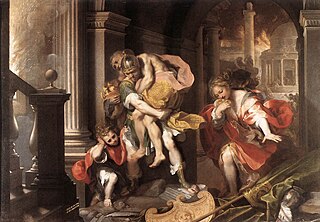
The Aeneid is a Latin epic poem that tells the legendary story of Aeneas, a Trojan who fled the fall of Troy and travelled to Italy, where he became the ancestor of the Romans. Written by the Roman poet Virgil between 29 and 19 BC, the Aeneid comprises 9,896 lines in dactylic hexameter. The first six of the poem's twelve books tell the story of Aeneas' wanderings from Troy to Italy, and the poem's second half tells of the Trojans' ultimately victorious war upon the Latins, under whose name Aeneas and his Trojan followers are destined to be subsumed.

In Greek mythology, Protesilaus was a hero in the Iliad who was venerated at cult sites in Thessaly and Thrace. Protesilaus was the son of Iphiclus, a "lord of many sheep"; as grandson of the eponymous Phylacos, he was the leader of the Phylaceans. Hyginus surmised that he was originally known as Iolaus—not to be confused with Iolaus, the nephew of Heracles—but was referred to as "Protesilaus" after being the first to leap ashore at Troy, and thus the first to die in the war.
In Greek mythology, the name Laodamia referred to:
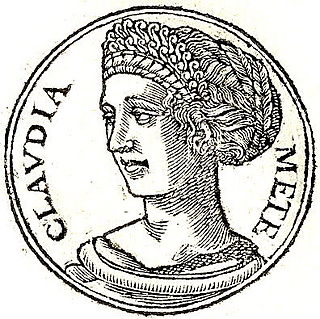
Clodia, nicknamed Quadrantaria, Nola, Medea Palatina by Cicero, and occasionally referred to in scholarship as Clodia Metelli, was one of three known daughters of the ancient Roman patrician Appius Claudius Pulcher.

Troilus and Criseyde is an epic poem by Geoffrey Chaucer which re-tells in Middle English the tragic story of the lovers Troilus and Criseyde set against a backdrop of war during the siege of Troy. It was written in rime royale and probably completed during the mid-1380s. Many Chaucer scholars regard it as the poet's finest work. As a finished long poem, it is more self-contained than the better known but ultimately unfinished The Canterbury Tales. This poem is often considered the source of the phrase: "all good things must come to an end" (3.615).

Troilus is a legendary character associated with the story of the Trojan War. The first surviving reference to him is in Homer's Iliad, composed in the late 8th century BCE.
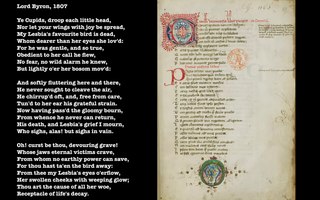
Catullus 3 is a poem by Roman poet Gaius Valerius Catullus that laments the death of a pet sparrow (passer) for which an unnamed girl (puella), possibly Catullus' lover Lesbia, had an affection. Written in hendecasyllabic meter, it is considered to be one of the most famous of Latin poems.

Catullus 2 is a poem by Roman poet Gaius Valerius Catullus (c. 84 – c. 54 BCE) that describes the affectionate relationship between an unnamed puella ('girl', possibly Catullus' lover, Lesbia), and her pet sparrow. As scholar and poet John Swinnerton Phillimore has noted, "The charm of this poem, blurred as it is by a corrupt manuscript tradition, has made it one of the most famous in Catullus' book." The meter of this poem is hendecasyllabic, a common form in Catullus' poetry.
Catullus 101 is an elegiac poem written by the Roman poet Gaius Valerius Catullus. It is addressed to Catullus' dead brother or, strictly speaking, to the "mute ashes" which are the only remaining evidence of his brother's body.

Catullus 5 is a passionate ode to Lesbia and one of the most famous poems by Catullus. The poem encourages lovers to scorn the snide comments of others, and to live only for each other, since life is brief and death brings a night of perpetual sleep. This poem has been translated and imitated many times.
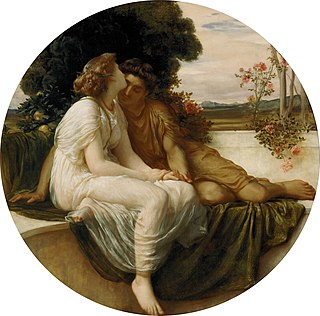
The poetry of Gaius Valerius Catullus was written towards the end of the Roman Republic. It describes the lifestyle of the poet and his friends, as well as, most famously, his love for the woman he calls Lesbia.
Laodamia is a narrative poem by William Wordsworth based on a story from the Trojan War.
Lesbia is a one-act play written by Richard Davey. The story is a comedy about the relationship between the Roman poet Catullus and his lover Lesbia. The actor-manager Richard Mansfield staged the play at the Lyceum Theatre in London, where it debuted on 17 September 1888 with Beatrice Cameron as Lesbia. Mansfield later took the play to the United States as part of the repertory of his company.
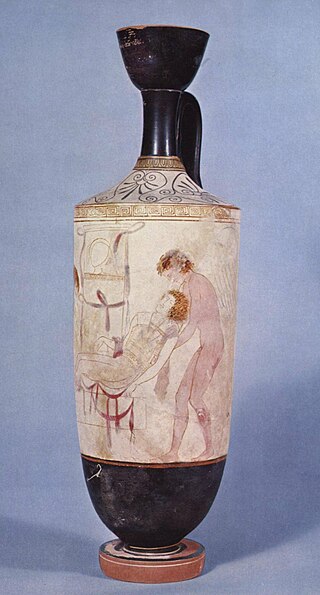
In Greek mythology, Sarpedon was a son of Zeus, who fought on the side of Troy in the Trojan War. Although in the Iliad, he was the son of Zeus and Laodamia, the daughter of Bellerophon, in the later standard tradition, he was the son of Zeus and Europa, and the brother of Minos and Rhadamanthus, while in other accounts the Sarpedon who fought at Troy was the grandson of the Sarpedon who was the brother of Minos.
References
- ↑ Garrison, Daniel (1989). The Student's Catullus 2nd Edition. p. 148.
- 1 2 Theodorakopoulos, Elena (2007). Skinner, Marilyn (ed.). "Poem 68: Love and Death, and the Gifts of Venus and the Muses" in A Companion to Catullus. p. 316.
- ↑ Wheeler, Arthur (1934). Catullus and the Traditions of Ancient Poetry. p. 172.
- ↑ Garrison, Daniel (1989). The Student's Catullus 2nd Edition. p. 150.
- ↑ Green, Peter (2005). The Poems of Catullus: A Bilingual Edition. p. 175.
- ↑ Theodorakopoulos, Elena (2007). Skinner, Marilyn (ed.). "Poem 68: Love and Death, and the Gifts of Venus and the Muses" in A Companion to Catullus. p. 325.
- 1 2 Vandiver, Elizabeth (2000). "Hot Springs, Cool Rivers, and Hidden Fires: Heracles in Catullus 68.51-66". Classical Philology. 95 (2): 151–159. doi:10.1086/449482. JSTOR 270454. S2CID 161829455.